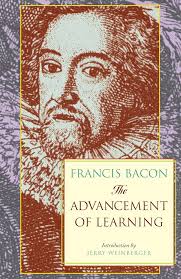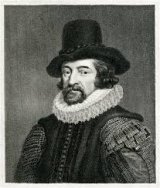The Advancement of Learning Page #16
The Advancement of Learning, published by Francis Bacon in 1605, is a foundational text in the history of science and philosophy. In this work, Bacon advocates for empirical research and the systematic organization of knowledge, laying the groundwork for the scientific method. The book critiques existing scholarly practices and proposes a new approach to learning based on observation and experimentation. It marks a significant shift towards modern scientific inquiry.
- Year:
- 1605
- 1,170 Views
Submitted by acronimous on August 11, 2024
Modified by acronimous on August 11, 2024
to so excellent a patroness; the convenient estate of wealth and means, both of crown and subject; the habit of obedience, and the moderation of discontents; and there be considered, on the other side, the differences of religion, the troubles of neighbour countries, the ambition of Spain, and opposition of Rome, and then that she was solitary and of herself; these things, I say, considered, as I could not have chosen an instance so recent and so proper, so I suppose I could not have chosen one more remarkable or eminent to the purpose now in hand, which is concerning the conjunction of learning in the prince with felicity in the people. (10) Neither hath learning an influence and operation only upon civil merit and moral virtue, and the arts or temperature of peace and peaceable government; but likewise it hath no less power and efficacy in enablement towards martial and military virtue and prowess, as may be notably represented in the examples of Alexander the Great and Cæsar the Dictator (mentioned before, but now in fit place to be resumed), of whose virtues and acts in war there needs no note or recital, having been the wonders of time in that kind; but of their affections towards learning and perfections in learning it is pertinent to say somewhat. (11) Alexander was bred and taught under Aristotle, the great philosopher, who dedicated divers of his books of philosophy unto him; he was attended with Callisthenes and divers other learned persons, that followed him in camp, throughout his journeys and conquests. What price and estimation he had learning in doth notably appear in these three particulars: first, in the envy he used to express that he bare towards Achilles, in this, that he had so good a trumpet of his praises as Homer’s verses; secondly, in the judgment or solution he gave touching that precious cabinet of Darius, which was found among his jewels (whereof question was made what thing was worthy to be put into it, and he gave his opinion for Homer’s works); thirdly, in his letter to Aristotle, after he had set forth his books of nature, wherein he expostulateth with him for publishing the secrets or mysteries of philosophy; and gave him to understand that himself esteemed it more to excel other men in learning and knowledge than in power and empire. And what use he had of learning doth appear, or rather shine, in all his speeches and answers, being full of science and use of science, and that in all variety. (12) And herein again it may seem a thing scholastical, and somewhat idle to recite things that every man knoweth; but yet, since the argument I handle leadeth me thereunto, I am glad that men shall perceive I am as willing to flatter (if they will so call it) an Alexander, or a Cæsar, or an Antoninus, that are dead many hundred years since, as any that now liveth; for it is the displaying of the glory of learning in sovereignty that I propound to myself, and not a humour of declaiming in any man’s praises. Observe, then, the speech he used of Diogenes, and see if it tend not to the true state of one of the greatest questions of moral philosophy: whether the enjoying of outward things, or the contemning of them, be the greatest happiness; for when he saw Diogenes so perfectly contented with so little, he said to those that mocked at his condition, “were I not Alexander, I would wish to be Diogenes.” But Seneca inverteth it, and saith, “Plus erat, quod hic nollet accipere, quàm quod ille posset dare.” There were more things which Diogenes would have refused than those were which Alexander could have given or enjoyed. (13) Observe, again, that speech which was usual with him,—“That he felt his mortality chiefly in two things, sleep and lust;” and see if it were not a speech extracted out of the depth of natural philosophy, and liker to have come out of the mouth of Aristotle or Democritus than from Alexander. (14) See, again, that speech of humanity and poesy, when, upon the bleeding of his wounds, he called unto him one of his flatterers, that was wont to ascribe to him divine honour, and said, “Look, this is very blood; this is not such a liquor as Homer speaketh of, which ran from Venus’ hand when it was pierced by Diomedes.” (15) See likewise his readiness in reprehension of logic in the speech he used to Cassander, upon a complaint that was made against his father Antipater; for when Alexander happened to say, “Do you think these men would have come from so far to complain except they had just cause of grief?” and Cassander answered, “Yea, that was the matter, because they thought they should not be disproved;” said Alexander, laughing, “See the subtleties of Aristotle, to take a matter both ways, pro et contra, &c.” (16) But note, again, how well he could use the same art which he reprehended to serve his own humour: when bearing a secret grudge to Callisthenes, because he was against the new ceremony of his adoration, feasting one night where the same Callisthenes was at the table, it was moved by some after supper, for entertainment sake, that Callisthenes, who was an eloquent man, might speak of some theme or purpose at his own choice; which Callisthenes did, choosing the praise of the Macedonian nation for his discourse, and performing the same with so good manner as the hearers were much ravished; whereupon Alexander, nothing pleased, said, “It was easy to be eloquent upon so good a subject; but,” saith he, “turn your style, and let us hear what you can say against us;” which Callisthenes presently undertook, and did with that sting and life that Alexander interrupted him, and said, “The goodness of the cause made him eloquent before, and despite made him eloquent then again.” (17) Consider further, for tropes of rhetoric, that excellent use of a metaphor or translation, wherewith he taxeth Antipater, who was an imperious and tyrannous governor; for when one of Antipater’s friends commended him to Alexander for his moderation, that he did not degenerate as his other lieutenants did into the Persian pride, in uses of purple, but kept the ancient habit of Macedon, of black. “True,” saith Alexander; “but Antipater is all purple within.” Or that other, when Parmenio came to him in the plain of Arbela and showed him the innumerable multitude of his enemies, specially as they appeared by the infinite number of lights as it had been a new firmament of stars, and thereupon advised him to assail them by night; whereupon he answered, “That he would not steal the victory.” (18) For matter of policy, weigh that significant distinction, so much in all ages embraced, that he made between his two friends Hephæstion and Craterus, when he said, “That the one loved Alexander, and the other loved the king:” describing the principal difference of princes’ best servants, that some in affection love their person, and other in duty
Translation
Translate and read this book in other languages:
Select another language:
- - Select -
- 简体中文 (Chinese - Simplified)
- 繁體中文 (Chinese - Traditional)
- Español (Spanish)
- Esperanto (Esperanto)
- 日本語 (Japanese)
- Português (Portuguese)
- Deutsch (German)
- العربية (Arabic)
- Français (French)
- Русский (Russian)
- ಕನ್ನಡ (Kannada)
- 한국어 (Korean)
- עברית (Hebrew)
- Gaeilge (Irish)
- Українська (Ukrainian)
- اردو (Urdu)
- Magyar (Hungarian)
- मानक हिन्दी (Hindi)
- Indonesia (Indonesian)
- Italiano (Italian)
- தமிழ் (Tamil)
- Türkçe (Turkish)
- తెలుగు (Telugu)
- ภาษาไทย (Thai)
- Tiếng Việt (Vietnamese)
- Čeština (Czech)
- Polski (Polish)
- Bahasa Indonesia (Indonesian)
- Românește (Romanian)
- Nederlands (Dutch)
- Ελληνικά (Greek)
- Latinum (Latin)
- Svenska (Swedish)
- Dansk (Danish)
- Suomi (Finnish)
- فارسی (Persian)
- ייִדיש (Yiddish)
- հայերեն (Armenian)
- Norsk (Norwegian)
- English (English)
Citation
Use the citation below to add this book to your bibliography:
Style:MLAChicagoAPA
"The Advancement of Learning Books." Literature.com. STANDS4 LLC, 2025. Web. 10 Mar. 2025. <https://www.literature.com/book/the_advancement_of_learning_3165>.








Discuss this The Advancement of Learning book with the community:
Report Comment
We're doing our best to make sure our content is useful, accurate and safe.
If by any chance you spot an inappropriate comment while navigating through our website please use this form to let us know, and we'll take care of it shortly.
Attachment
You need to be logged in to favorite.
Log In